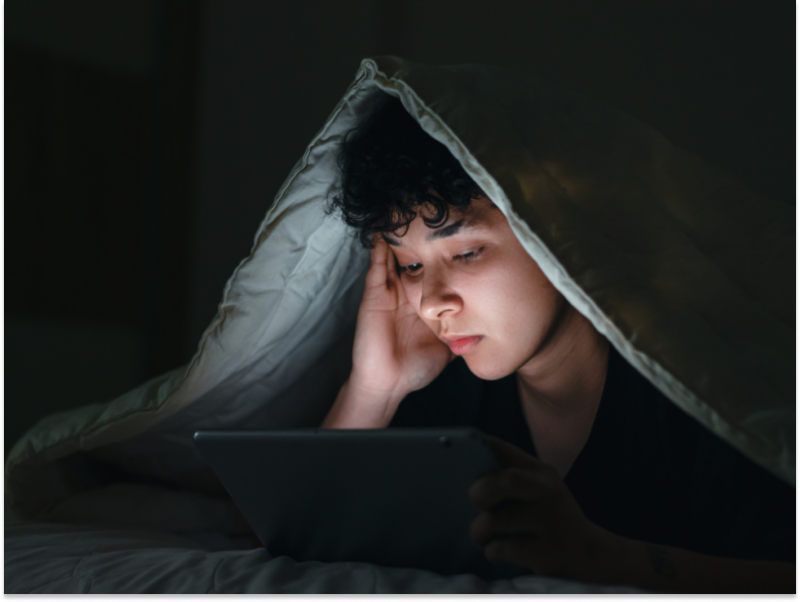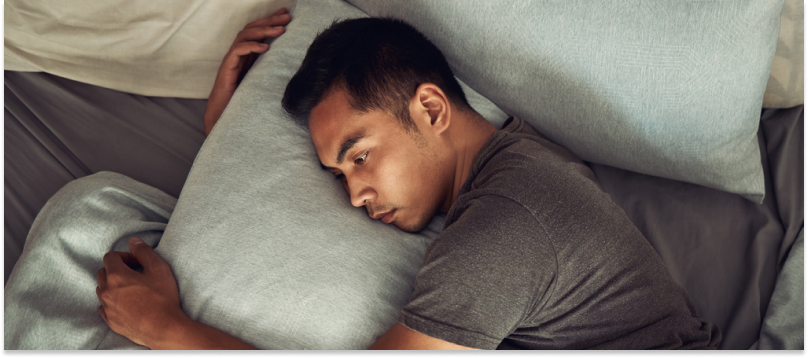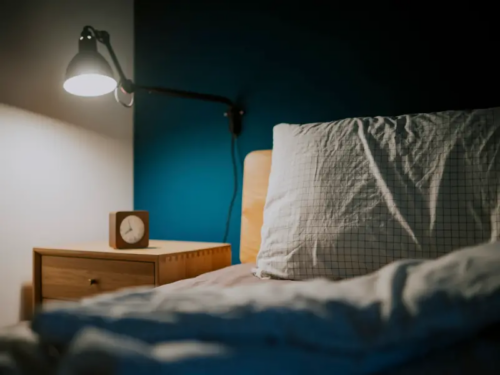
Table of Contents
“Why Am I Anxious at Night?”: Contributing Factors and Ways to Get Help

Written By: Sarah duRivage-Jacobs

Clinically Reviewed By: Dr. Don Gasparini
June 12, 2023
6 min.
More than one-third of adolescents may lie awake at night because of stress. Why does anxiety seem to get worse at night? And what can you do about it? Read on to find out.
Learn more about our Clinical Review Process
Table of Contents
Anxiety is something that everyone experiences, and for many the symptoms get worse at nightime—whether or not they have a clinically diagnosed anxiety disorder.
Anxiety symptoms at nighttime can include wandering thoughts, sleep anxiety, or something more disruptive like nocturnal panic attacks, there’s often an uptick in anxious symptoms around the hours of sleep. In this article, we’re exploring why anxiety gets worse at night, what the relationship between sleep and mental health is more broadly, and how people with heightened evening anxiety can find some relief.
Why anxiety gets worse at night
There are many reasons why people may get more anxious in the evening. While everyone’s situation is unique, there are three main categories for thinking about increased anxiety at night.
1. Anxiety before bedtime
For many people, the nighttime is the first time of day when there’s enough quiet and calm for the mind to wander. Unfortunately, for some, that wandering allows anxiety to take hold.
“Did I sound silly when I asked that question in class? Will I be able to keep my cool during tomorrow’s presentation? How can I hide my nervousness on my date this weekend?” These are the kinds of thoughts that might wander through the mind of an anxious person before bedtime.
Whether it’s worrying about the past, the present, or the future, the evening mind can be a (not fun) playground for anxious thoughts.
In 2013, 35% of teens who participated in the Stress in America survey reported lying awake at night because of stress in the month before the survey. While the survey is from a full decade ago, newer research confirms that teens have only become more anxious since then.
2. Anxiety about sleep
Some people feel anxious about falling and staying asleep. Those with a history of sleep problems, like insomnia or narcolepsy, may get especially nervous before bed.
Sleeping is also simply a vulnerable state to be in—your guard’s down, and there’s no way to know for sure what’s going on around you. In that way, falling asleep requires a level of trust in your environment which can feel difficult for people with anxiety.
According to the Cleveland Clinic, people with certain mental health conditions may be more likely to get sleep anxiety. These conditions include:
- Anxiety disorders
- Bipolar disorder
- Depression
- Substance use disorders
- Panic disorder
- Post-traumatic stress disorder (PTSD)
- Schizophrenia
3. Nocturnal panic attacks
Nocturnal panic attacks are panic attacks that happen while someone’s sleeping. People with nocturnal panic attacks are awakened from sleep in a state of panic, often with a racing heart, sweating, and gasping for air.
Among people with panic disorder, or regular panic attacks, nocturnal attacks are widespread: 7 in 10 people with panic disorder may experience attacks while they sleep.
People are also more likely to have nocturnal panic attacks if they have:
- Issues with anger or hostility
- Anxiety disorder
- Depression
- Insomnia
- Sleep apnea
- Obsessive-compulsive disorder (OCD)
- Substance use disorders
The relationship between sleep and mental health
Sleep and mental health are interconnected in many ways, anxiety at night being just one of them.
People with mental health conditions might have trouble sleeping, and people with sleep disorders may experience anxiety before bed because they’re afraid they won’t be able to fall asleep. If issues arise in one area, the other area may not be far behind.
What’s more, not getting a good night’s sleep—which, as mentioned, can be caused by anxiety—can also make anxiety worse. A 2019 meta-analysis (a review of multiple studies) of sleep research found that insomnia, or the routine inability to sleep, significantly contributed to anxiety and other mental health issues. Why? According to the review’s authors, one possible reason is that sleep helps us process complex emotions, like understanding if someone is safe or if they’re a threat. “Thus, chronic sleep deprivation in the form of insomnia disorder,” as the authors wrote, “may impair adequate emotional processing and thus increase vulnerability for [mental health conditions].”
Sleep and stress are both greatly impacted by hormones. When the levels of stress hormones are higher, you become awake and alert. Prolonged stress can lead to the production of a stress hormone called adrenocorticotropic hormone, which people with insomnia typically also have at higher levels.

How to calm anxiety at night
Because sleep and mental health are so connected, for people with anxiety disorders, treating the disorder is the best way to reduce anxiety at night. However, according to experts from Harvard Medical School, the usual recommendations for better sleep hygiene can also help.
Treatment for anxiety disorders
The most effective treatment for children and adolescents with anxiety disorders is a combination of cognitive-behavioral therapy (CBT) and a type of medication called selective serotonin reuptake inhibitor (SSRI).
(CBT) is a form of psychotherapy that focuses on helping people understand the thoughts and patterns that cause them distress—and then take steps to reframe them in new, more positive ways.
SSRIs are a type of antidepressant that works by increasing the activity of serotonin, a chemical messenger that impacts mood, in the brain. SSRIs are very safe and effective, and they’re often prescribed for depression, anxiety disorders, and mental health conditions. Because SSRIs can help with mental health symptoms, including anxiety, research shows they can also help with anxiety-induced sleep problems. However, in the short term, some SSRI medications may have a negative impact on sleep. Taking very low doses long enough before bedtime can reduce some of these negative effects.
Join the Charlie Health Library
Get mental health updates, research, insights, and resources directly to your inbox.
You can unsubscribe anytime.
Better sleep hygiene
Improving sleep hygiene can also help people with anxiety disorders feel less anxious at night. These 13 tips for better sleep hygiene are a good place to start, but it’s important to bring up how you’re feeling and sleeping during visits with your healthcare provider:
- Maintain a consistent sleep schedule, even on the weekends.
- Get natural light from the outdoors for 30 minutes every day.
- Get regular exercise, but not right before bed.
- Hit snooze on naps before an hour is up, and don’t nap at all after 3 pm.
- Don’t consume caffeine past the afternoon. Some people may need to avoid it completely if it increases their anxiety.
- Talk to your healthcare provider about your medications to see if anything, like a stimulant, might be impacting your sleep.
- Avoid alcohol, a large amount of fluids, big meals, or foods that cause heartburn for several hours before going to bed.
- Consider quitting smoking if you smoke. It can make sleeping more difficult.
- Keep it dark, cool, and quiet in your bedroom before going to bed.
- Don’t use electronics in bed. The light can make your brain think it’s still daytime.
- Replace your mattress if it’s uncomfortable.
- Read, listen to music, or relax with a hot bath or a deep-breathing exercise before bed.
- If you haven’t fallen asleep after 20 minutes or wake up in the middle of the night and don’t fall back asleep after 20 minutes, get out of bed and try to do something that relaxes you until you’re ready to go back to sleep.
How Charlie Health can help
Teens and young adults can receive effective, high-quality treatment for anxiety disorders at Charlie Health. If anxiety at night is already disrupting your life, you don’t have to worry about our program doing the same: Charlie Health offers evening and weekend sessions for our Intensive Outpatient Program, so you can keep up with your daily interests and responsibilities while accessing care.
Struggling with anxiety at any time of the day can make it harder to lead a fulfilling, joyful life. By prioritizing your mental health and addressing your unique strengths and areas of opportunity, you can stop anxiety from holding you back and keeping you up at night. Charlie Health can help you do that.
Get in touch today to take the first step of your healing journey. We’re available 24/7 to help you find out if Charlie Health is the right treatment program for you.





